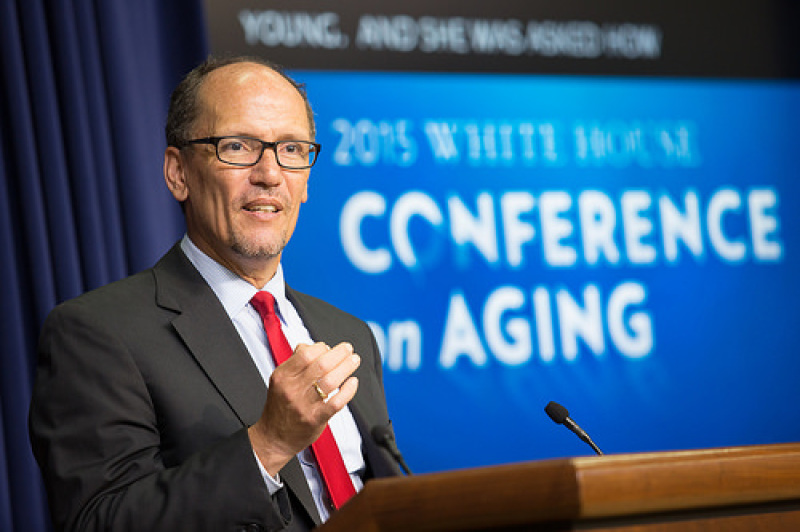

US Secretary of Labor Thomas Perez delivering the closing remarks at the White House Conference on Aging
On Monday, the White House hosted the White House Conference on Aging (WHCOA), a conference that has been held once a decade since 1961. President Obama was joined by experts and advocates for aging Americans to deliberate on the issues of aging in America. The conference also streamed live on the White House web page with more than 600 "watch parties" across the country.
"One of the best measures of a country is how it treats its older citizens. And by that measure, the United States has a lot to be proud of," Obama said during the conference. However, "we have to work to do more to ensure that every older American has the resources and the support that they need to thrive."
The discussion revolved around caring for older Americans, with mention of topics like health care policies and retirement plans. Obama urged the audience of the need to prepare for the rapidly growing population of seniors, which, in part, can be contributed to the aging baby boomer population.
Journalist and AARP Financial Ambassador Jean Chatzky spoke of the importance of planning for financial security, saying that saving for retirement goes against most people's' intuition. She said "three-quarters of us take Social Security at age 62. By doing that we leave a ton of money on the table," encouraging people to be slow to taking Social Security.
One initiative proposed by the Centers for Medicare and Medicaid Services called for the improvement in the delivery of meals and antibiotics, revision of safety requirements, and assurance that staff members are properly trained to care for patients with dementia.
Secretary Sylvia Burwell from the Department of Health and Human Services says during the conference that in order to help the aging population is for Congress to reauthorize the Older Americans Act that expired in 2011 and has not be reauthorized since. The Older Americans Act was the first federal initiative to provide extensive care for older adults and would fund amenities like meals and job training for seniors and senior centers.
The American Health Care Association conveyed concern primarily about the financial costs of new regulation as Medicare spent nearly $6000 billion in 2013 according to the Centers for Medicare and Medicaid Services. According to the Milken Institute, chronic diseases cost the US economy more than $1 trillion a year.
Addressing the concerns about the costs of health care services, Obama says, "We've got to keep slowing the growth of health care costs, and keep building on the progress we've already made in the past few years."
This year's WHCOA marks the 50th anniversary of Medicare, Medicaid, and the Older Americans Act, including the 80th anniversary of Social Security.



















